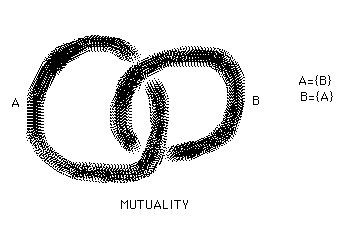3. Mutuality
The old ideas of “the male as active and the female as passive, the woman as receptacle and the man as fulfiller” are violations of the mutuality principle. True relationship entails a context recognizing each partner’s activity and each partner’s receptivity -- each partner’s giving and each partner's receiving. “Two liberties meet, two bodies meet, two hearts come together” – and if they aren’t both bringing roughly equivalent levels of heart and self to the encounter, it isn’t mutual.
4. Equality
Just love means that the partners bring roughly equal levels of power and autonomy to the relationship. Inequalities of power may come from differences in social and economic status, or differences in age and maturity. Teachers and their students have an inherent power inequality, as do counselors and their clients, ministers and their parishioners. The principle of equality also “rules out treating a partner as property, a commodity, or an element in market exchange.”
5. Commitment
Brief encounters are not ruled out, but even in brief encounters, let there be commitment to the preceeding principles, at least, and also commitment to be open to the possibility that the encounter may lead to long-term relationship. If there is no prospect of leading to long-term relationship, the brief sexual encounter is ethically suspect.
“Sexuality is of such importance in human life that it needs to be nurtured, sustained, as well as disciplined, channeled, controlled....Brief encounters...cannot mediate the kind of union -- of knowing and being known, loving and being loved -- for which human relationality offers the potential.” (Farley)6. Fruitfulness
The traditional norm is procreation. The procreation imperative comes from a deeper underlying principle of fruitfulness. We can now see that making babies is only one way to be fruitful.
The relationship must not close in on itself. Love brings new life to those who love, and that new life is to be brought outward to the nourishing of other relationships. A relationship of just love strengthens the partners, and encourages them in their just work in the world. Thus is love fruitful and for the good of all.
And that leads to:
7. Social Justice
The ethic of Just Love requires not only that we bring certain principles to our own romantic and intimate relationships, but that we participate in making a society that honors and respects romantic and intimate relationships.
“Whether persons are single or married, gay or straight, bisexual or ambiguously gendered, old or young, abled or challenged in the ordinary forms of sexual expression, they have claims to respect from...[our faith] communit[ies] as well as the wider society. These are claims to freedom from unjust harm, equal protection under the law, an equitable share in the goods and services available to others, and freedom of choice in their sexual lives -- within the limits of”these principles (Farley).
Those seven principles – seven principles, where have heard of that? -- do no unjust harm, free consent, mutuality, equality, commitment, fruitfulness, and social justice -- offer acceptance and healing where the old sexual ethic so often wounded and repressed.
“The journey of love is a very long journey. But sometimes with a sigh you can cross that vast desert.” (Mohammed Iqbal)Standing on the side of love means also marching on the side of love, as many of the UUs of Gainesville did at the Pride Parade last Saturday (Sep 29). We wore our yellow shirts in support of LGBT acceptanace -- and a better understanding of the ethic that brings justice and love together.
To that: Amen.
* * *
This is part 5 of 5 of "Just Love: Sexual Ethics Today"
Previous: Part 4: "Our Bodies Our Selves"
Beginning: Part 1: "Radical Inclusivity"




No comments:
Post a Comment